‘There is no other safe way to bring the seafarers out (of Somalia), other than to negotiate and give the ransom...’
‘See, the government of India cannot pay the ransom money. That’s the problem… When I was in captivity I felt India is such a big country powerful why can’t they bring us back? But when I came back (I understood the problem gradually)’
‘I think brutal is a very soft word for them (Somali pirates). It is unimaginable. Every single minute is like death. You can see death just coming towards you.’
Chirag Bahri, himself once a captive in Somalia for eight months, who now helps piracy victims, speaks to Vaihayasi Pande Daniel/Rediff.com on how they achieved the near-impossible task of freeing seven Indian sailors held captive for four years and getting them back to India.
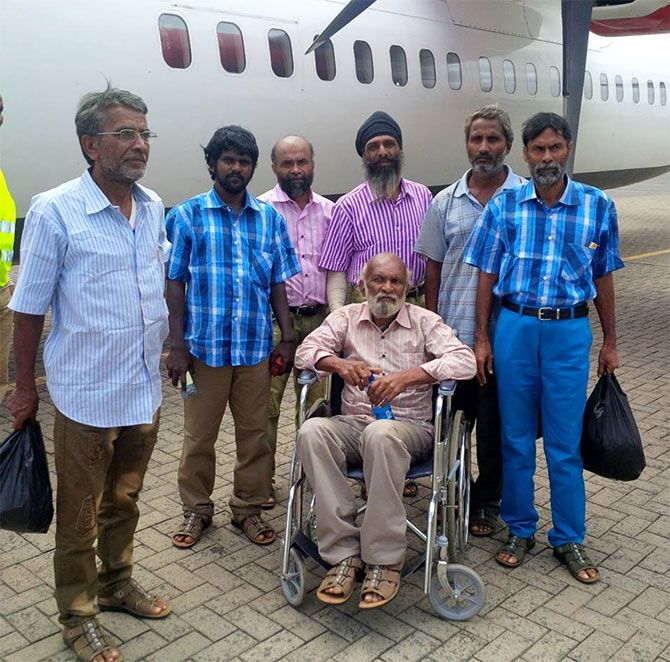
Seven sailors (left to right) of the hijacked MV Asphalt -- Bahadur Singh, 58 (Mumbai), Litton Daniston Anthony, 27, (Tuticorin), George Joseph, 60, (Ernakulam), Sohan Singh, 45, (Ludhiana), Bhim Sen Singh, 45, (Visakhapatnam), Manjeet Singh, 57 (Mumbai), T B Unnikrishna, 57, (Kottayam) in the wheelchair -- arrive at Wajia, Kenya, on a chartered flight from Harardhere, Somalia, on October 30, 2014, after being in captivity since 2010. Photograph courtesy: MPHRP
___________________________________________________________________________________________________________________
Standing on the tarmac at Wajia airport near the Kenya-Somalia border on October 30, waiting for seven Indians who had been kept hostage for four years, would have brought back memories for Chirag Bahri, Indian coordinator for the Maritime Piracy Humanitarian Response Programme that aids piracy survivors and their families.
As the tired men — Bahadur Singh, 58, Manjeet Singh, 57, T B Unnikrishnan 57, George Joseph, 60, Sohan Singh, 45, Bhim Sen Singh, 45, Littton Daniston Anthony, 27, all crew members of the Panama-flagged bitumen and asphalt carrier MV Asphalt, hijacked September 28, 2010 by Somali pirates — saw Bahri excitedly waving at them, their faces broke into giant grins. He was the first Indian they were seeing in more than four years.
"They just rushed to me… They hugged me tightly," says Bahri.
This was almost a repeat of Bahri's own release in January 2011 from the hijacked MT Marida Marguerite at Garad, Somalia, and his arrival into Salalah, Oman.
Since his release in 2011, after nine years at sea and eight months in captivity, Bahri, a seafarer from Delhi, opted to join the MPHRP.
His imprisonment made him realise the urgent need for an Indian coordinator to help the families of those kidnapped — the coordinator his family did not have when he went missing.
"My family needed someone at that time. That's why I am working on this as passion. When these people returned they will not have that kind of guilt. That nobody was there to look after their family when they were away," Bahri says.
The last seven hostages from MV Asphalt were a particularly traumatised bunch — theirs was the longest stint of incarceration Indian sailors had faced with Somali pirates.
Bahri and the MPHRP's aid had been essential.
Between 2005 and 2012, pirates operating in Indian Ocean waters near Somalia, hijacked around 200 ships.
With the release of the seven sailors from Asphalt, there are no more Indian sailors left in captivity, although there are 30 Asians still there. And merchant navy vessels have not been hijacked since May 10, 2012.
"We don't have sympathy for the pirates," says Bahri. "But yes, definitely for the Somali people. All Somalis are not pirates. There is a civil war going on in Somalia. They are in a devastating condition. They have suffered the worst abuse. When I was there I heard the stories and I had tears in my eyes while listening to them."
In an interview with Vaihayasi Pande Daniel/Rediff.com, Bahri talks about how he went from captive to aid giver.
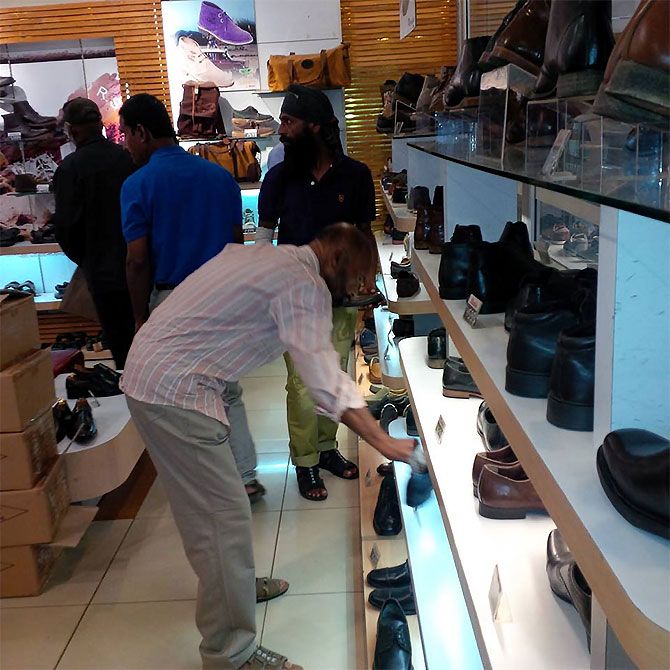
Shopping for new clothes in Nairobi before taking the flight to Mumbai. Photograph courtesy: MPHRP
___________________________________________________________________________________________________________________
So how did you start helping hijack victims after you came back?
I felt that something needed to be done to support the families (left behind in India). The families didn’t know where to go and what had to be done in these circumstances.
I think there were more than 200 people (in captivity). (Ships) were still getting hijacked after that -- in 2011 and 2012. The last ship that was hijacked was in May 2012.
I was approached by MPHRP -- which is headquartered in London -- to be part of the team and start the operations in India and South Asia…
Our task was to keep in contact with the families of people held in piracy and try to provide humanitarian support…
So (everyone) worked together, to reach the families, give them financial support. Some of the times -- not all the time -- the owner abandons the ship and the seafarers and their families (are also) abandoned.
There is no other safe way to bring the seafarers out, other than to negotiate and give the ransom... In the meantime we try to provide moral support (to the families)… Since I was there too… I can tell them: “The intention of the pirates is not to kill your brother or your loved one. The pirates only need money.”
Just to reassure them; that will at least help them to sleep at night.
Who should get the credit for the release of these seven sailors?
MPHRP, along with our international partners. They are assisted, financially and in other ways… They have all funded us and helped sustain (as well as) do our operation.
In this particular case what was your role?
Firstly, we were in contact with the families. Provided them (support) and medical care.
We (worked) with the Government of India to provide the families with some (sort of) job opportunities because the owner (of MV Asphalt) was not paying any money…
Gave them some moral support. Every day my phone was available to them to call me up. They had different issues. Sometimes they had pension issues. Sometimes their bank account had been closed… Sometimes they had mobile problems… Small, small issues. Gas connection problems. To get the college, or the school, to reduce the fees of the child by about 70-80 per cent… If they had any kind of issues they could call me up…
We tried our best with very good support of the Indian government. They have done a very good job here.
How did the Indian government help?
The Indian government has also provided financial support because the owner was not paying money. They helped provide jobs. They talked with the ministry of human resources and worked out the jobs. The ladies needed jobs in schools as teachers. They are now working in the Kendriya Vidyalaya schools.
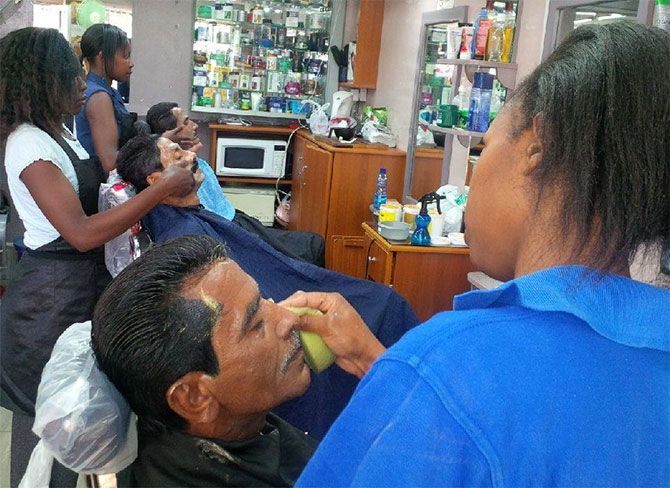
At the barber shop, in Nairobi, getting rid of those unkempt beards. Photograph courtesy: MPHRP
___________________________________________________________________________________________________________________
And was the Indian government supportive all through?
Absolutely. Absolutely.
I can name the people who have been really helpful. Mr Deepak Shetty, joint director general of shipping in Mumbai. I cannot say I have seen anyone like him in my whole life. Even if a family member called him late at night he would respond, he made sure they were again comfortable and then went back to sleep…
Right from day one he pushed all the ministries to get (the families) jobs. He met personally with the HRD ministry and different commissioners of the Kendriya Vidyalayas to ensure they got proper jobs and the jobs are not taken back once the seafarers came out…
He is still writing letters continuously to them to make sure. He has not forgotten them… He was there late night at 2 O’clock when we arrived (from Wajia via Nairobi) and (ensured) that customs immigration was done very quickly, got VIP access so they didn’t have to stand in queues and all.
Absolutely brilliant response from the Government of India.
And you went to Kenya to meet the sailors when they were released?
I went to Wajia, which is in a corner of Kenya. Every flight coming from Somalia needs to land (at this place) in Kenya, get the immigration, customs and security checks and then they fly to Nairobi. Wajia is the first entry point.
Where were they coming from?
Harardhere (south eastern Somalia, inland from the coast) was where they were held captive. We sent a chartered plane for them.
They were coming by themselves on this chartered plane?
I can’t name anyone because of the security issues, but there were some people who went in the chartered plane to bring them back.
Your organisation MPHRP along with your international partners negotiated with the pirates?
We do not negotiate directly. We hire consultants who have professional experience in negotiating with pirates. Consultants who have done well before while dealing with the piracy cases. We hired them and that’s how it worked out.
Who are these consultants?
They are very recognised people, who live in London. They are not locals. They are very, very professional. They have done so many cases before.
Did the Government of India play a special role in the negotiations or was this purely done by MPHRP?
See, the Government of India cannot pay the ransom money. That’s the problem…
When I was in captivity I felt India is such a big country powerful why can’t they bring us back? But when I came back (I understood the problem gradually)
But the (government) was always there, wanting to be kept informed. They were very concerned. Every day we were updating them on the status.
The ministry of shipping and the ministry of external affairs were always in contact with MPHRP.
An article on your web site says these pirates think wrongly they can get a lot of money by kidnapping sailors. Also, because usually the owner deserts the ship. How does your organisation reason this out with the pirates?
It is only very, very few owners who have abandoned their ships (none of the ships hijacked were Indian owned). You can count the number of owners who have abandoned the ship. There were hundreds of ships that have been hijacked. A very small percentage of owners who have abandoned their ships…
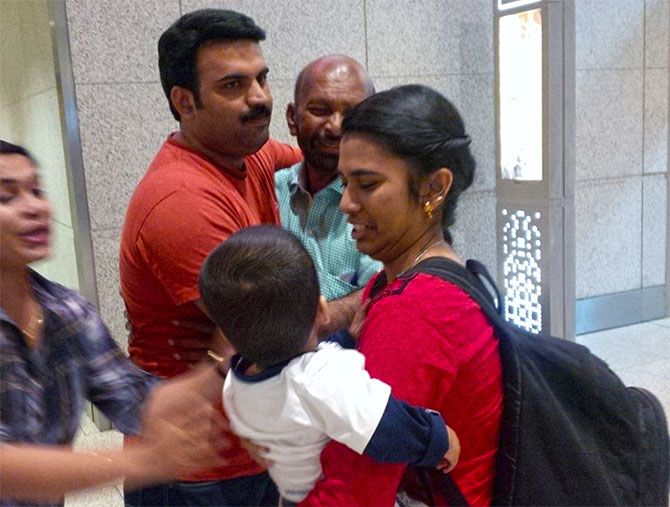
Family reunions, after four and a half long years, at Mumbai airport. Photograph courtesy: MPHRP
___________________________________________________________________________________________________________________
Was MV Asphalt abandoned too?
Not abandoned as such. The owner had paid the money in 2011 to the pirates ($3.5 million ransom, according to Wikipedia). A deal was struck and the owner paid the pirates. The pirates released eight Indians (of the 15 held) and the ship. They (the pirates) cheated. And took seven Indians on land (instead of releasing all). The owner did play his part initially.
Why did the pirates renege on their agreement? Why did they keep the seven back?
They realised that the Indian Navy has arrested (some) 120 pirates, who are still in Indian jails. They tried to negotiate for the release of their loved ones. They said if you release our pirates, our Somali guys, we will release your seven (remaining) Indians.
Any government cannot be forced to release a criminal on that basis. That’s why things got delayed in the court and (elsewhere). It was going nowhere.
So to finally to release these seven sailors the Somali pirates gave up their demand of getting those jailed 120 pirates back?
That’s correct.
How was your organisation able to make them realise that there would be no prisoner exchange?
The pirates, held in Indian jails, were allowed to make phone calls to their families quite often. That was the mental support that was offered to them by the courts of India -- they can call their families back home.
They were given very good treatment. At least better treatment than they get in Somalia. In Somalia there is no place to live. There is no security for their life. The food is horrible. They don’t have anything.
So I think they are having a better place and life in an Indian jail than they would have in Somalia. They probably conveyed that message to (their) Somali people (back home) that we are happy, we are satisfied here. Don’t worry.
And that’s how there was a change in the attitude of the Somali pirates who were holding the Indian seafarers. That’s why they turned it back into a money game again. And then the negotiations started up again.
So the negotiations were finally done with a little more money?
I’ll say (some) money was paid. Only the transportation and the costs incurred to the pirates in keeping the crew in captivity.
You were also held in captivity. Are the Somali pirates brutal?
I think brutal is a very soft word for them. It is unimaginable.
Every single minute in Somalia is like death. You can see death just coming towards you. Food is there in front of you. But there is no zeal to have the food. Because you are so afraid that in a second a pirate will come and start beating you up. They would start beating you so badly.
My chief engineer and captain were kept in the meat room, naked, in -17 degrees (Celsius) for 40 minutes. We were beaten up badly. Hung upside down. Hands and legs tied up. Genitals also they tied up.
When I came back for almost seven to eight months I was doing my medicals and physiotherapy and that is how I recovered. Lots of physical torture.
They have iron rods. They would just pick up iron rods and start beating us. They wouldn’t see if it is hitting the head or the leg or wherever. They just start hitting.
There is no medical care. There is no safety or security of life in Somalia.
They will keep firing bullets in the air and fire bullets that will pass near your ears. One mistake and everything is gone.
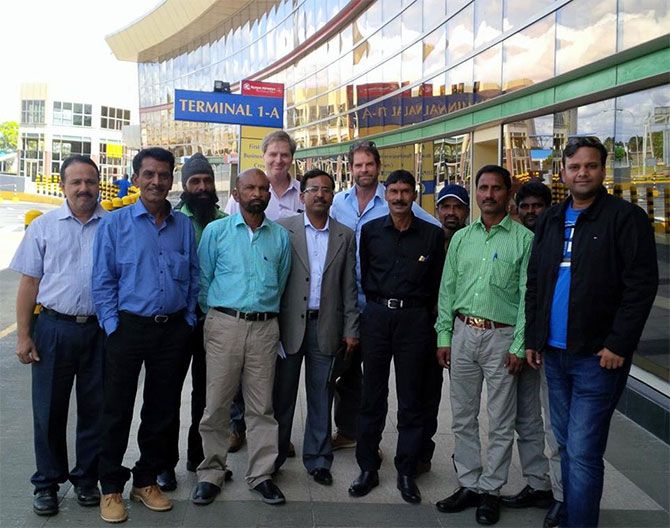
The returning sailors outside Mumbai airport with MPHRP India coordinator Chirag Bahri (far right). Photograph courtesy: MPHRP
___________________________________________________________________________________________________________________
Can Somali piracy still start again? What are the factors that could bring it back?
Seafarers have (become much) more aware of piracy. International navies have been doing a good job in the Indian Ocean. There are armed security guards on most of the vessels now. Owners are hiring armed security guards when they are transiting through piracy-infested waters. They fire in the air. And the pirates just go away… they get afraid because the ships are (higher) and they are (lower). So they don’t come near the vessel then.
But are pirates still around?
The pirates are really trying hard. They are ready to get a ship. They have their reconnaissance in place. They are just waiting for the right time to get a vessel.
But piracy has reduced a lot and we don’t see that it will become that scenario it was in 2010, 2011 when there were some 50-60 ships hijacked. That won’t be the case (again) because everybody has learned so many lessons. International organisations have really put a lot of time and effort in bringing about a situation where no hijacks can happen... But we should also not relax back and say okay, piracy is over and we go freely. We have to take our precautions. You never know when you have hard luck, so just prepare yourself well.
What will happen to the seven men who have just come back?
Still too early to say. It will take time to get there. They need to heal, spend time with their families, relatives, and friends. We have already assured them that if they want to go back to ships again, we will again help them in getting some good shipping companies…
And if they don’t want to go back to sea?
We will try and find some shore job for them. We will work with the Government of India. In the past the government has provided jobs for the families of these people. If they provided jobs for the families, they will also definitely help us in providing for the seafarers.









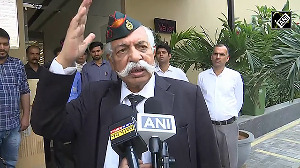
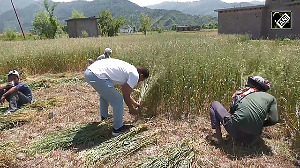

 © 2025
© 2025